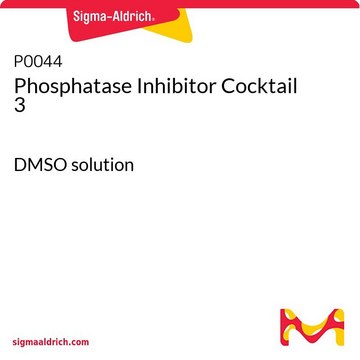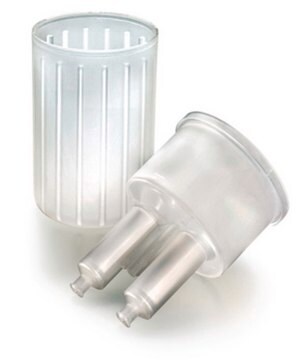524624
Phosphatase Inhibitor Cocktail I
liquid, for the inhibition of alkaline phosphatases and serine/threonine protein phosphatases
Synonyme(s) :
Phosphatase inhibitor
About This Item
Produits recommandés
product name
Phosphatase Inhibitor Cocktail Set I, Phosphatase Inhibitor Cocktail Set I contains three inhibitors that will inhibit alkaline phosphatases as well as serine/threonine protein phosphatases such as PP1 and PP2A.
Niveau de qualité
Forme
liquid
Fabricant/nom de marque
Calbiochem®
Conditions de stockage
OK to freeze
Conditions d'expédition
ambient
Température de stockage
−20°C
Description générale
Actions biochimiques/physiologiques
Alkaline phosphatases as well as serine/threonine protein phosphatases such as PP1 and PP2A
Forme physique
Reconstitution
Informations légales
Code de la classe de stockage
10 - Combustible liquids
Classe de danger pour l'eau (WGK)
WGK 1
Point d'éclair (°F)
188.6 °F - closed cup - (Dimethylsulfoxide)
Point d'éclair (°C)
87 °C - closed cup - (Dimethylsulfoxide)
Certificats d'analyse (COA)
Recherchez un Certificats d'analyse (COA) en saisissant le numéro de lot du produit. Les numéros de lot figurent sur l'étiquette du produit après les mots "Lot" ou "Batch".
Déjà en possession de ce produit ?
Retrouvez la documentation relative aux produits que vous avez récemment achetés dans la Bibliothèque de documents.
Les clients ont également consulté
Notre équipe de scientifiques dispose d'une expérience dans tous les secteurs de la recherche, notamment en sciences de la vie, science des matériaux, synthèse chimique, chromatographie, analyse et dans de nombreux autres domaines..
Contacter notre Service technique














